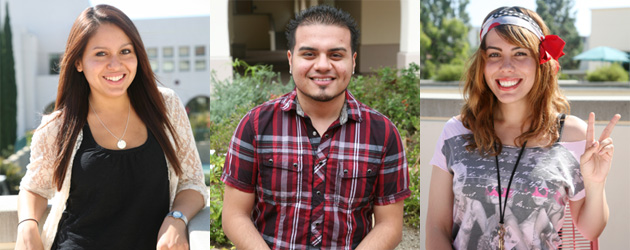Students Talk HACU
SDSU students talk about their experience at the Hispanic higher education conference.

San Diego hosted the 24th annual conference of the Hispanic Association of Colleges and Universities (HACU) in mid-September. SDSU took part, as well as all other local institutions of higher learning, with close to 1,500 in attendance.
Titled “Championing Hispanic Higher Education Success: Expanding Opportunities in Challenging Times,” the conference provided a forum for networking to advance higher education and employment opportunities for Hispanics.
Educating Hispanic students
James R. Kitchen, vice president for Student Affairs, notes that Hispanics are now the nation’s largest minority population.
“Our future economic and social success depends on the education of today’s Hispanic students,” he said.
Around 40 SDSU students participated, sponsored by Student Affairs departments and HACU scholarships—the largest student contingency in attendance. They were there to network and to meet representatives from various federal agencies regarding employment and internship opportunities.
Students came away recognizing the importance of career preparation and networking as it pertains to their respective majors and future career plans.
'Best conference I've been to'
Liz Rodriguez, a senior with a double major in Spanish and international security and conflict resolution, called it “definitely the best conference I’ve been to in my five years here at State.”
The first in her immediate family to attend college, she hopes to find a job working for the U.S. Department of State.
“I want to facilitate peace in the world,” she said. “There’s so much to do, and I hope I can be a part of it.”
Rodriguez credits a high school AVID teacher and an older cousin for providing the encouragement she needed to set her sights on higher education.
“I was one of only six Latinas in my high school to go to college,” she said. “SDSU is a much more diverse campus, so I feel more comfortable here. But still, being a Latina can be challenging.”
In HACU conference keynote remarks, CIA Director Leon Panetta described his agency’s efforts to diversify its workforce.
“We need your ingenuity. We need your skills. We need your perspective,” he told conference participants.
Panetta committed to a continued partnership with HACU to build opportunities and careers within the CIA for Hispanic graduates. Rodriguez found Panetta’s words inspiring—and emboldening.
“He talked about his own background; he started in a place I could relate to, at the bottom, and he worked his way up,” she said. “I went up to him, and I said, ‘You talked about wanting more diversity in the CIA, and I want to help you with that, so here I am.’ And I handed him my resume.”
Many opportunities
Senior Carlos Quintero was at the conference as a participant and as a workshop presenter. He is involved in Compact for Success, a partnership between SDSU and Sweetwater Union High School District. The program guarantees SDSU admission to district students who meet certain benchmarks. His presentation focused on how Compact for Success helps these students, many of whom are Hispanic.
“As a student, being Latino can make things both harder and easier,” Quintero said.
“English isn’t my first language, so I’ve had to work harder on academics in general. There are lots of stereotypes, and sometimes they bring you down.
“But there are so many opportunities right now, too, like scholarships, and government assistance and conferences like HACU. This gives me the motivation to keep going.”
Quintero definitely aims to keep going; he has plans for a doctorate and wants to teach and do research in psychology.
Resume workshops and leadership training
Sophomore Estefania Castañeda said HACU was her first conference ever. She appreciated attending resume workshops and leadership training, as well as meeting graduate school recruiters and networking with other Hispanic students from SDSU and other universities.
On a full four-year scholarship to SDSU as a President’s Diversity Scholar, she is the first in her family to get a chance at a college education.
"I'm encouraged to strive for success because minorities are so underrepresented at universities, so I want to get the most out of my education, especially as a Latina," she said.
Castañeda believes more Hispanic students need to get into the hard majors , like math, engineering, and government, to make it to positions of influence. The political science major wants eventually to land a government job in Washington, D.C.
"I want to make a difference in the world," she says. "There's not a lot of Latinos in Washington D.C. I want to go there and inspire others that they can do it, too."
Enhancing national competitiveness
Eric Rivera, associate vice president for Student Affairs, was the HACU student track keynote speaker. He cites predictions that one of every two workers entering the U.S. labor force by 2025 will be Hispanic. The Obama administration has set goals to increase Latino college completion rates through 2025.
“To increase our nation’s economic competitiveness,“ Rivera said, “American universities must now commit to Latino student success in higher education.”
SDSU, Rivera said, is on the verge of becoming an official “Hispanic-serving institution,” which will bring increased research funding and stronger ties to the Hispanic community. While such institutions represent less than 10 percent of all higher education institutions nationally, they are home to more than two-thirds of all Hispanic college students.



